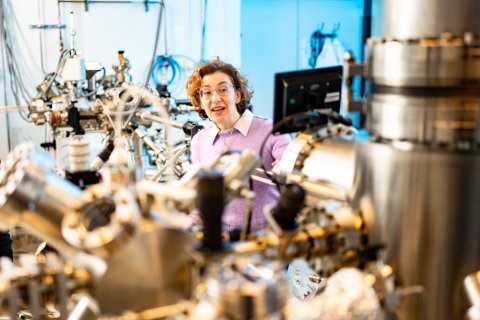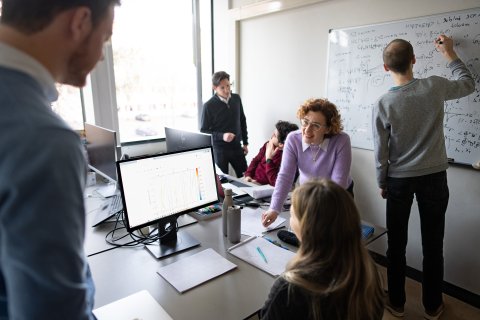Zeila Zanolli

Ever since I have a memory of my inner self, I was fascinated by intellectual challenges and constant learning. I was an avid reader, and my dream was to solve scientific problems that no one had solved before. When I was 11, I found a role model in Rita Levi Montalcini, an Italian female scientist who was awarded the Nobel prize in Medicine and Physiology. She is a remarkable example of resilience and dedication to science. In Physics I find the freedom of thinking, supported by mathematics and experiments. These elements are essential to make free thinking concrete, realistic and able to make discoveries that can address actual problems, such as designing a new family of quantum materials for sustainable energy solutions.
Sharing science
At Utrecht University I am working on exactly what I dreamed of: fundamental research in the field of Quantum Materials, using a theoretical and computational approach. Educating students is also part of the job. I teach two courses, so my teaching load is not too heavy, which I like very much as it allows me to dedicate most of my time to research. I work in close collaboration with my experimental colleagues, who are world leading in this field. Our research interests match perfectly, and the collaboration is dynamic, stimulating, and fruitful.
In my team we develop theory and solve the quantum mechanical Schroedinger equation of complex materials using open source software, which we co-design. Using this approach, we compute the fundamental properties of the materials: electronic, magnetic, topological, superconducting, topological, spectroscopic. We use this knowledge to design the materials of the future, i.e. new materials for low-energy consumption electronics or photovoltaics. In this way we contribute to build a sustainable future society.
It is important to acknowledge that mutual support is crucial for progress in science. The lonely genius scientist is a myth.

To address fundamental complex problems and make research relevant for realistic systems, it is necessary to combine experiments with a theoretical approach. In my research group, jointly with my collaborators at UU, we do so on a nanometer - Ångstrom scale.
A second family
My colleagues immediately made me feel welcomed and like one of them. With my closest collaborators we share ambitious research projects and a common vision on how to achieve them. The joint effort we put into our work creates a strong bond, as a second family. I have been lucky to have colleagues who are not only wonderful human beings, but also ready to help with practical matters (which can be challenging coming from abroad), very open and very enjoyable for any kind of discussion.
It is important to acknowledge that mutual support is crucial for progress in science. The lonely genius scientist is a myth. I believe, instead, that science is a collaborative effort, both in research and navigating the academic system. One should always be open to offer and receive suggestions and advice.
Blue sky research
As soon as I joined Utrecht University, I could immediately start working at cutting edge topics in Topological Superconductivity and Quantum Materials. This was made possible through the sector plan and Chemistry department funds, which allowed me to set up a new research group, with PhD candidates and Postdocs doing blue sky research. Each member of the team brings a different expertise and is eager to join forces and mutual collaboration.
I consider my work as open ended and curiosity driven. Solving a problem opens the door to new research questions. My research emerges by following the path of learning new theories, performing computer simulations, combining old and new methods, reflection, tuning, exploring analogies from seemingly distant fields, and starting over again. Within my team, we are practicing slow science: taking the time to read, study, explore, and reflect. At the same time, we are aware that academic research is highly competitive, and I encourage my team members to focus and be timely in achieving their research objectives.
dr. Z. (Zeila) Zanolli
Associate Professor

